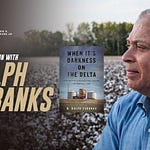I had nightmares as a little boy. Not just the typical ones of monsters and mean people, but of falling with no end in sight and of haints that held down my hands and feet. My eyes would open, at least I thought they were open, and I couldn’t move. Witches were riding me.
I guess I had an active imagination. Plus, I was generally afraid. One of the interesting things about growing up in Mississippi was that life remained enchanted. No hard separation between worlds. Spirits mingled with people. Just the other day, my mother, who has been changing my sister’s diapers for sixty years, said that “Mama and Russell must be messing with Bonita. She has been laughing all night.” With a chuckle, my dad chimed in. “Yep. She hadn’t slept at all. Just laughing.”
There’s something beautiful about that. People you love can come back, if just for a time. Mystery remains, giving life a bit of color.
But there is an underside. When my dad’s youngest brother died by his own hands, after the burial, my dead uncle came by the house to let my father know that he was alright. My dad was born with a caul over his face, we were told. Gifted, I suppose, with second sight. He told us that morning that Uncle Adrian had visited. Knocked on the bedroom door with his special knock. My mother, frightened, heard it too. They told him to come on in, but he didn’t. I listened with a shudder. Thinking that my uncle was angry. Because where I am from, when people don’t die right, they don’t stay in the ground.
I have been thinking about that lately. About the harsh nature of our politics and the tension that seems to characterize so much of American life. Algorithms move us about, intensifying our disagreements and drowning us in contempt. But grief has us all by the throat. Too many people didn’t die right, and the crazed nature of our times may be rooted in the fact that our dead are riding us. Our eyes are open, but we can’t move.
In her brilliant novel, Sing, Unburied, Sing, Jesmyn Ward captures the haunting consequences of those who cannot stay in the ground. Hers is a story of the revenant that shadows our days. “The old folks always told me that when someone dies in a bad way, sometimes it’s so awful even God can’t bear to watch, and then half your spirit stays behind and wanders….” Sounds familiar. Ward is from the water too.
But it is this moment in the novel that continuously draws my attention:
And the branches are full. They are full with ghosts, two or three, all the way up to the top, to the feathered leaves. There are women and men and boys and girls. Some of them near to babies. They crouch, looking at me. Black and brown and the closest near baby, smoke white. None of them reveal their deaths, but I see it in their eyes, their great black eyes. They perch like birds, but look as people. They speak with their eyes: He raped me and suffocated me until I died I put my hands up and he shot me eight times she locked me in the shed and starved me to death while I listened to my babies playing with her in the yard they came in my cell in the middle of the night and they hung me they found I could read and they dragged me out to the barn and gouged my eyes before they beat me still I was sick and he said I was an abomination and Jesus say suffer little children so let her go and he put me under the water and I couldn’t breathe. Eyes blink as the sun blazes and winks below the forest line so that ghosts catch the color, reflect the red. The sun making scarlet plumage of the clothes they wear: rags and breeches, T-shirts and tignons, fedoras and hoodies.
They died because their lungs clogged up; they died, too many, alone. The haunting and terror of history – of a past just behind us.
As the ghosts raged and threatened, the baby, Kayla, waved her hand and told them to stop and to go home. Calm came, if but for a moment. From the mouth of a baby came the half-garbled words and melody that soothed and opened up possibility, like Denver’s decision to step off the edge of the world in Toni Morrison’s Beloved. Home, the ghosts say, Home.
Our troubles cut deeper than we think. We MUST acknowledge the ghosts that rage today. Tending to them – with something like remembrance – amounts to tending to unresolved grief that has us so angry in both worlds.











